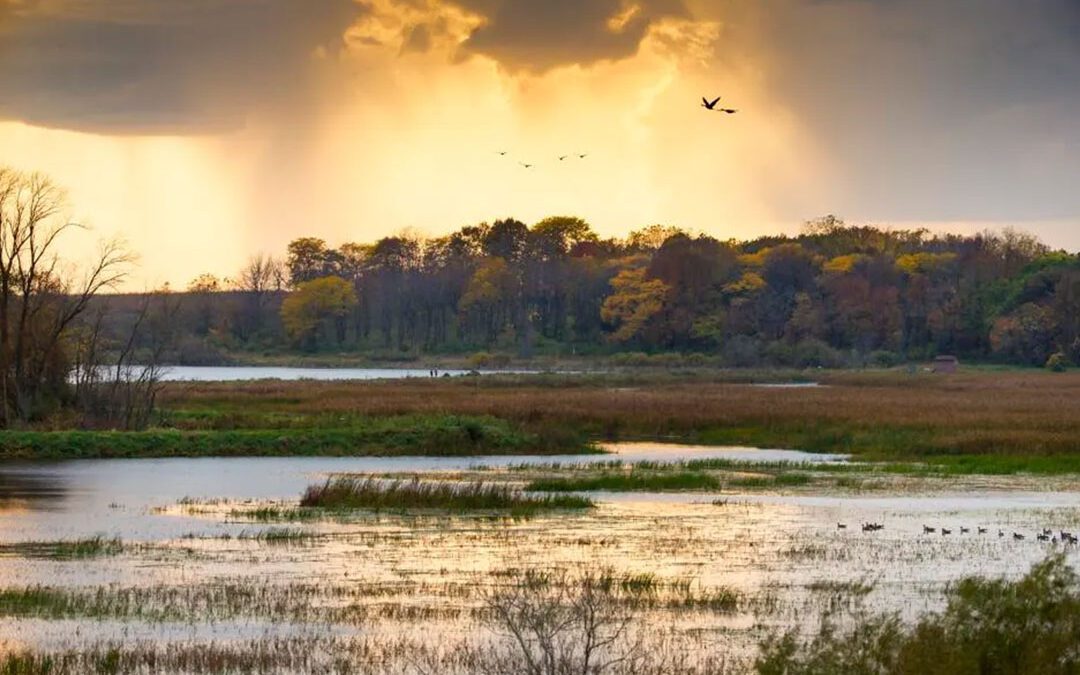Over the last 87 years, the organization has conserved 16 million acres of waterfowl habitat—the same cover that hundreds of non-game species depend on for their survival as well. Duck hunters joining DU have also served as the backbone of the National Wildlife Refuge System, for every waterfowl hunter must purchase a federal duck stamp that, to date, has generated $1.1 billion to create 588 refuges totaling nearly 900 million acres of land and water.
Since its inception, DU has raised nearly $3.5 billion and provided a critical voice for conservation in Washington, Ottawa and state and provincial houses across the continent. The organization’s approach of attracting members and volunteers, hosting fundraising events across the country, and luring other private and public dollars became the model for the rise of the camo coalition of hunter and angler-funded conservation groups.
Today, elk, turkeys, pheasants, quail, grouse, mule deer, salmon, trout, tarpon, redfish and myriad other species all have their own non-profit support groups. In nearly all cases, the work being done to save the habitat critical to those species is benefitting scores of other non- target fish and wildlife.
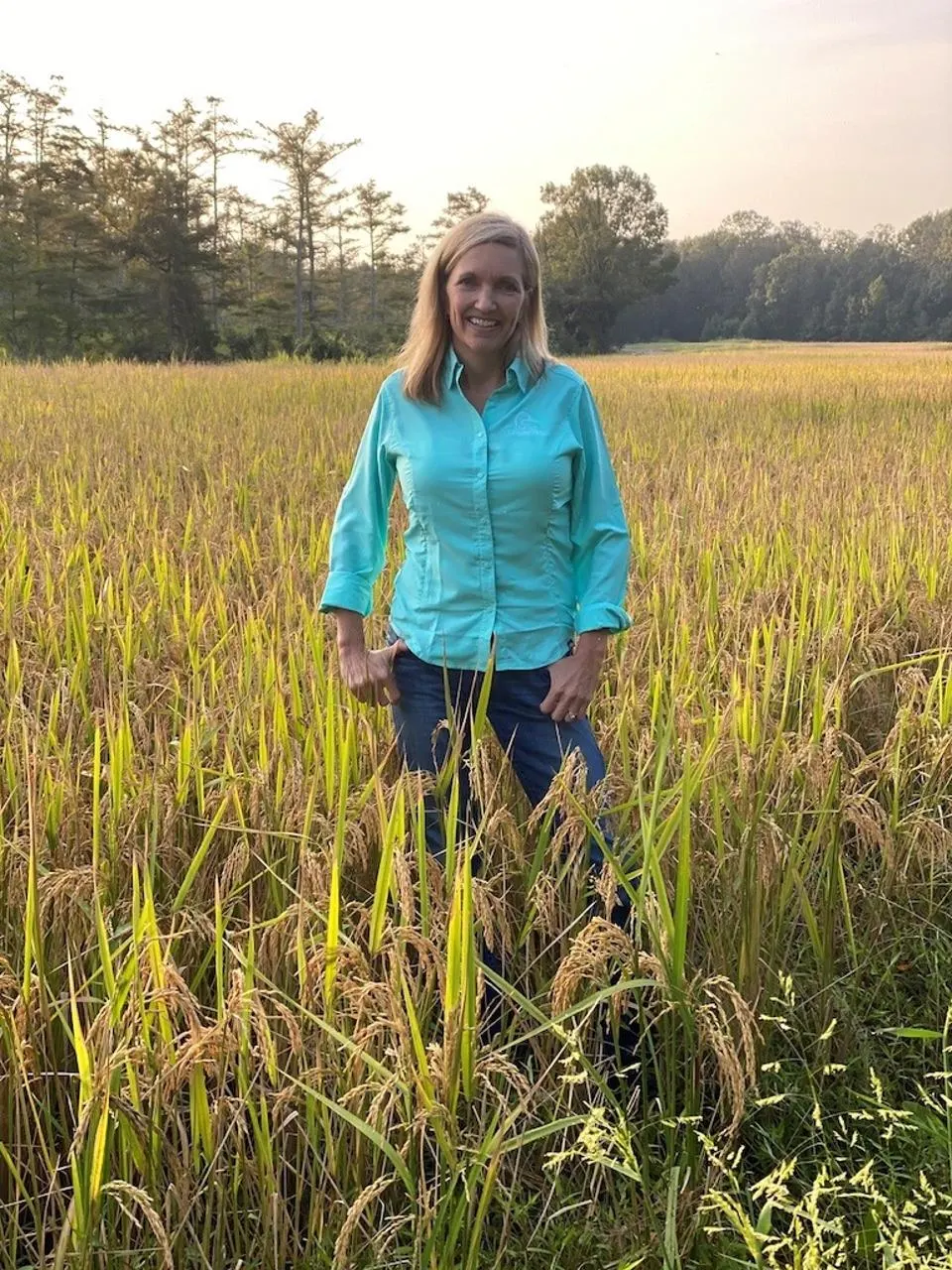
DU’s Dr. Karen Waldrop has been instrumental in the organization’s milestone to conserve one million acres in a single year.
The fundamental premise of all these organizations is that no one cares for the resource like those who enjoy and experience it. Whether you like hunting or not, there’s no debate that hunters have provided the lion’s share of funding and leadership that has driven unprecedented conservation successes.
Ducks Unlimited also learned early on that if you want to be successful, you need to put fun in fundraising. If you’ve never attended a DU grassroots event, they’re a blend of class reunion and Super Bowl party with an auction and cash bar. The latter being the secret sauce, for the organization learned from the start that the quickest way to a person’s wallet is through a cocktail…or two.
In 2023 alone, more than 30,000 volunteers hosted nearly 600,000 attendees at 4,555 events to raise money for the organization’s North American habitat initiatives. Today, the group generates more than $90 million of its roughly $320 million annual revenues from its event system.
As the organization has grown, however, so have their funding sources. Leveraging private dollars by attracting matching state and federal funds has been a hallmark of the organization for decades, proving to be an especially effective approach to delivering conservation on scale. In 2023, some 49 percent of DU’s revenue came from state and federal funds along with nongovernmental partnerships.
“It’s always been about stretching dollars to deliver the greatest impact,” says Adam Putnam, a long-term Florida congressman and former Agriculture Commissioner who was hired by DU in 2019 to lead the organization’s new era. “When you demonstrate results on-ground, you build long-term trust with your members, corporate and governmental partners.”
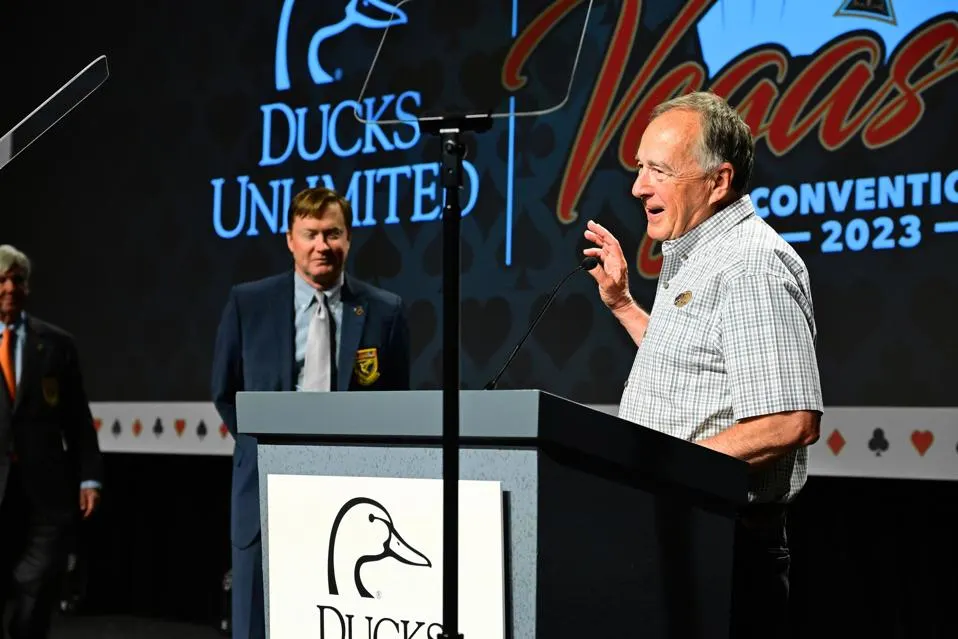
Bass Pro Shops founder Johnny Morris celebrates the organization’s recent achievements with DU chief Adam Putnam.
Political wonks might remember that Putnam held a decisive lead on Ron DeSantis in the 2018 Florida governor’s race. However, when DeSantis was able to secure Donald Trump’s endorsement, the trajectory of the race changed. Politics’ loss was DU’s gain, however, for many viewed Putnam as just the kind of first-round draft choice the conservation world needed.
“He possesses exactly the kind of experience, personality, and communications skills that we need in a challenging time for conservation,” says Dr. Christine Thomas, former Dean of the University of Wisconsin- Stevens Point College of Natural Resources and Senior Vice President of DU’s Conservation Programs.
“He’s a proven leader who gets things done,” said Florida Fish and Wildlife Conservation Commission chairman Rodney Baretto and long-time Putnam admirer. “We hated to see him leave Florida, but under his leadership, he has Ducks Unlimited operating at a whole new level.”
A key differentiator for DU has been its pragmatic approach to conservation. They have long worked with energy, industry, and agriculture to find on-ground solutions with the belief that the nation needs power, homes, and food to thrive.
In the era of Environmental, Social and Governance (ESG) investing, where companies are struggling to find ways to meet shareholder demands on the environment while staying true to their core values, DU’s non- confrontational approach to commerce has positioned them well with scores of potential partners who have grown leery of the tactics of the green movement.
Two such partners include outdoor retail giant Bass Pro Shops and First Horizon Bank. Over just the last three years, Bass Pro Shops has contributed some $2 million which helped DU conserve more than 76,000 acres of habitat. The relationship with Johnny Morris and Bass Pro has opened doors for DU to the retailer’s investments in reinvigorating the outdoor lifestyle through entertainment and cultural events that celebrate the nation’s hunting and fishing heritage.
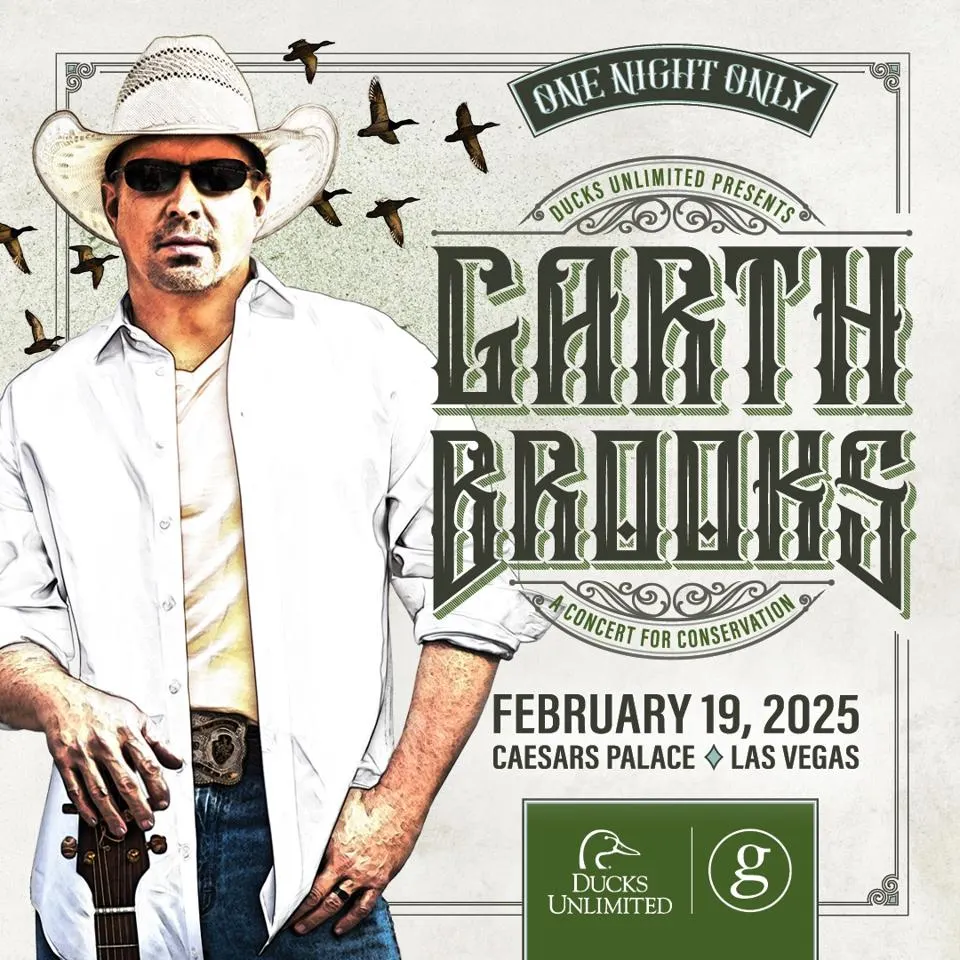
Country music star Garth Brooks is helping DU engage new audiences while raising conservation funds.
Part of Bass Pro Shops’ investment in DU is bringing one of their stars, country music legend Garth Brooks, to the relationship to raise additional funds while at the same time introducing Brooks’ fan base to the work being done by DU.
“Ducks Unlimited has been winning on the ground for a long time,” says Johnny Morris. “They continue to demonstrate the way forward with their science-based approach to wildlife conservation. We’re honored to partner with them and look forward to continuing our relationship for many years into the future.”
For Putnam, sowing the seeds for the next generation of conservationists and DU supporters is central to the organization’s mission—as is reaching beyond the nation’s 900,000 duck and goose hunters to enlist the general public in the effort to save critical habitat.
DU looked for non-traditional ways to take their work mainstream and quickly embraced a series of IMAX films that showcase the fragile ecosystems across North America where they are focused. They enlisted support from Memphis-based First Horizon Bank to sponsor a special screening tour of Wings Over Water, narrated by Golden Globe-winner Michael Keaton.
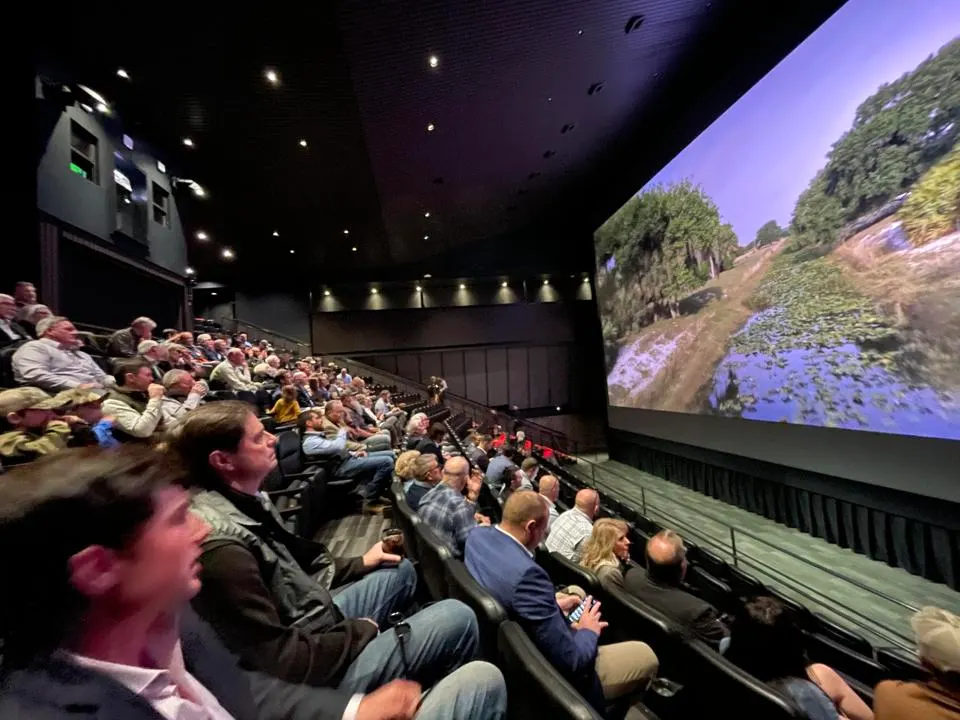
DU is engaged in supporting a series of IMAX films that are showcasing the group’s focus ecosystems and introducing their work to new donors.
The film hit IMAX theaters nationwide last year and, in addition, DU has held dozens of private screening events for major donors, corporate leaders, state and provincial delegations, non-governmental partners, along with public policy leaders and members of Congress. The giant screen format proved to be an immersive way for DU to celebrate and showcase the 275,000-square mile Prairie Wetlands of western Canada and the Dakotas where some 70 percent of North America’s water birds are produced.
“Wings Over Water is a powerful way to share our message and mission to a new pool of supporters,” says Putnam, “while energizing our existing ones who are passionate about reaching the next generation of Prairie Wetland advocates.”
A new film on the efforts to save Great Salt Lake and its surrounding marshlands from disappearing is set for release this fall and yet another giant screen film on the threatened coastal marshlands of Louisiana also is in the works with DU’s participation.
In addition to the films’ theatrical releases, content from them is being delivered in short form along with supporting K-12 curriculum introducing the importance of wetlands conservation to more than 10,000 schools reaching an unprecedented 8 million students weekly—fully 15 percent of all school-aged kids in America. It’s the kind of scale most in the conservation community believe is needed if there’s going to be hope for the future.
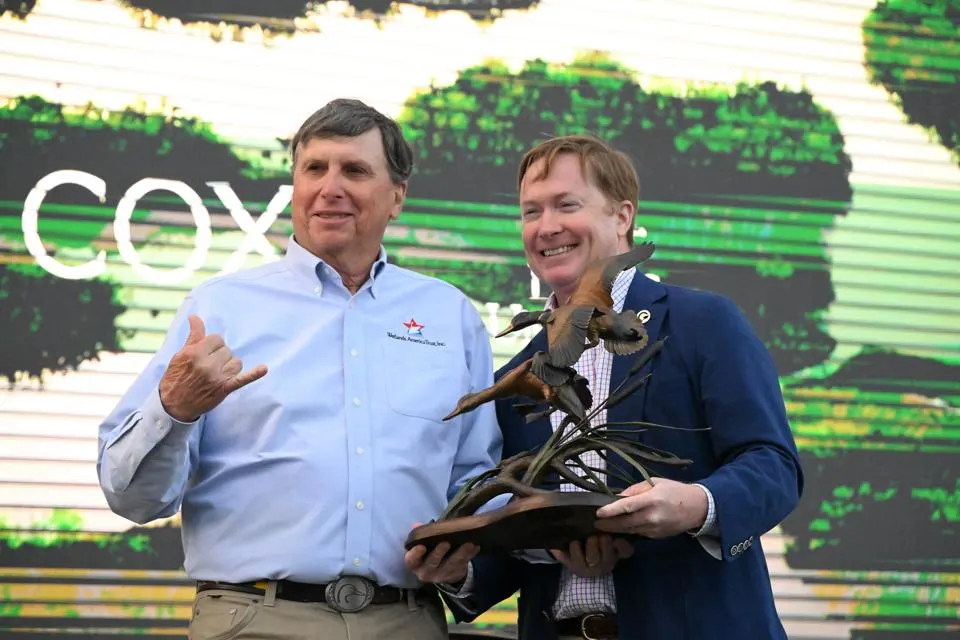
Jim Kennedy (left) and Putnam are all smiles as they announce the organization’s largest ever contribution—$100 million named in Kennedy’s honor.
Despite DU’s success, conservation is facing significant headwinds with growing demands for land and resources. DU knows they are on the clock to save many threatened habitats before it’s too late. Because of that urgency, last year the organization announced one of the most ambitious wildlife habitat initiatives ever attempted in North America, the $3 billion dollar Conservation for a Continent campaign. They’re looking to raise the heady sum by 2026 and have already surpassed the $2 billion milestone with two years remaining.
To bolster the effort, Cox Enterprises recently announced a $100 million gift to DU’s Wetlands America Trust, the organization’s foundation arm. The gift will come from the James M. Cox Foundation in honor of its long- time chairman Jim Kennedy, a conservation philanthropist of note and veteran DU leader and supporter.
“It has always been important to me to leave the world better than I found it,” said Kennedy. “Ducks Unlimited and Wetlands America Trust are great partners to conserve and restore our prairies for future generations.”
Thanks to DU’s accelerated fundraising efforts, the organization recently announced that for the first time in their nearly 90-year history they were able to conserve more than one million acres in a single year. Because of their historic efficiency converting dollars to habitat, DU boasts a 98 rating from Charity Navigator who says you can give with confidence to the group.
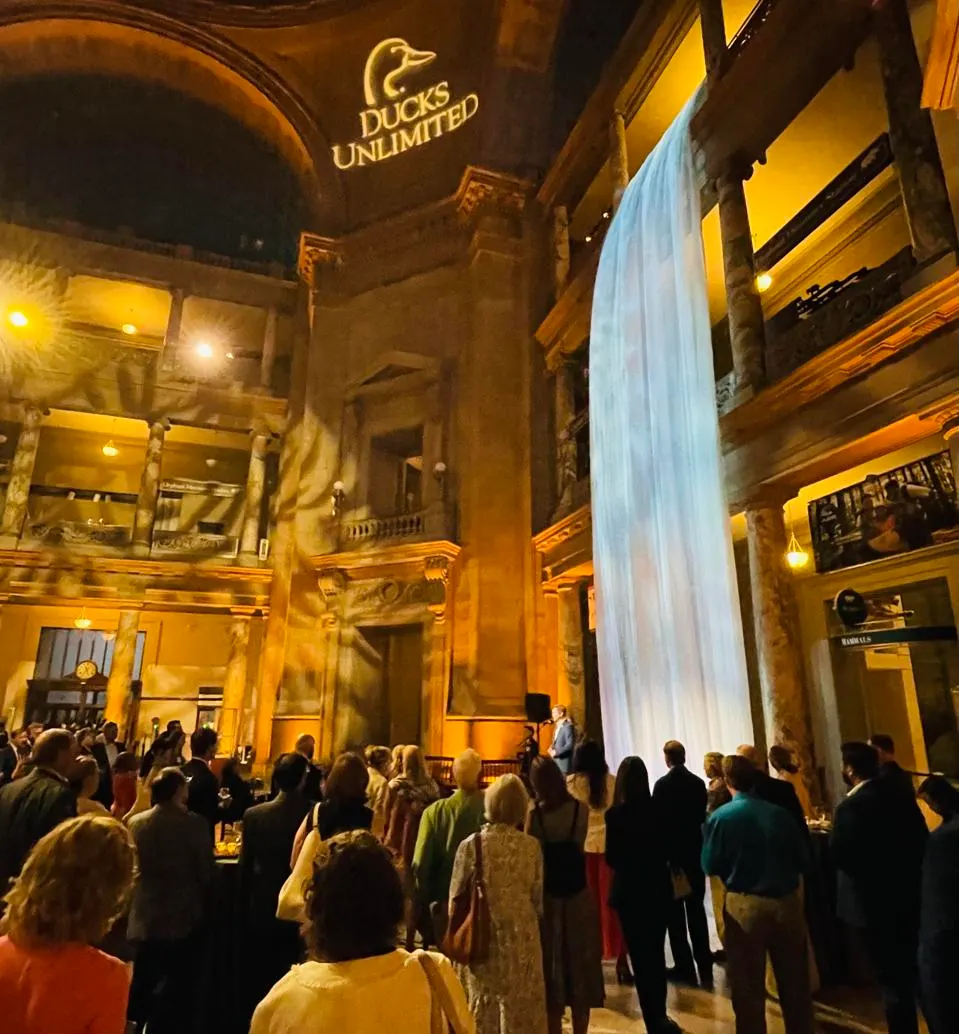
DU hosts an IMAX screening of a DU-supported film in front of hundreds of public policy makers and members of Congress at Washington’s Smithsonian.
And that’s something their more than one million supporters have known for a long time.

